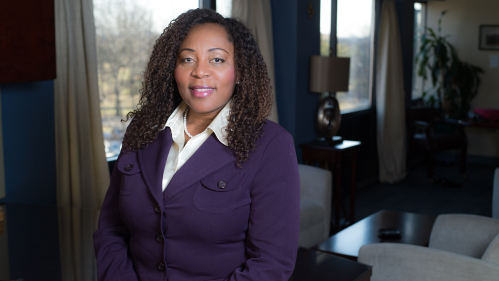Rutgers-New Brunswick Provost Shares Personal Connection to Access Week

Francine Conway’s childhood commitment to learning motivates her to foster the success of underrepresented students
Francine Conway’s childhood quest for education began with an outdoor classroom in Guyana.
Conway, who is now Rutgers-New Brunswick’s provost and executive vice chancellor for Academic Affairs, was told when she first wanted to go to school that she was too young, and there was no room for her. But her grandmother improvised and changed her life.
“My grandmother, who raised me and saw the value of education although she did not have an education herself, built a little bench for me,’’ Conway said. “Every day I walked the dirt road, taking that little bench with me, so I could be a part of that outdoor classroom. That’s how I started my academic journey: I was eager to learn and, though the conditions were impoverished, my grandmother made it happen.”
Conway shared her story, which fuels her drive to ensure educational access for all students, in a video recorded for Access Week. Rutgers-New Brunswick Chancellor Christopher J. Molloy, a Rutgers alumnus and first-generation student, also recorded a message about the university’s commitment to educational access.
Led by the Division of Diversity, Inclusion, and Community Engagement, Rutgers-New Brunswick is celebrating its eighth annual Access Week to champion educational equity for first-generation, low-income and other underserved students.
Conway, who was the first member of her family to attend college, became an award-winning child psychologist and the first Black dean of Rutgers-New Brunswick’s Graduate School of Applied and Professional Psychology before assuming her current role in November.
“When I was a faculty member and department chair, and students came to my office to discuss their difficulties, I often saw myself in them. You never know who you’re speaking with when you address a student; they could be a future president of the United States or the next great scientist. It is really important to me that we not count people out, that we provide access to ensure they are not counted out.’’
In her video message to students, Conway explains the transformative power of access to an education.
“Educational access means that as we pursue excellence in our institutions, we make sure that we are inclusive of groups that have been systematically excluded such as low-income students, first-generation students, students with disabilities, students of color, women in STEM fields and working adults, to name a few,’’ she said.
“As an immigrant, Black woman and first-generation college student, I can say that access to higher education transformed my life. I would not have the quality of life that I have, the opportunity to meet incredible people and thrive as an individual, without higher education and the opportunities that were afforded to me,” Conway said.
Rutgers strives to ensure that low-income, first-generation and historically underrepresented students succeed. The university fosters the success of underserved students through a range of programs, including Rutgers Future Scholars, Rutgers Upward Bound, Scarlet Promise Grants, the New Jersey Equal Opportunity Fund, Student Support Services and a new partnership with Cooperman College Scholars.
Rutgers is a top performer among the 120 American Talent Initiative universities, which have pledged to enroll 50,000 more low-to-moderate income students by 2025. About 30 percent of Rutgers-New Brunswick students receive Pell grants, making Rutgers one of only 45 ATI members with a Pell grant share at or above 20 percent.
In addition, Rutgers’ four- and six-year graduation rates are 24 percent and 21 percent above the national average, and its graduation rate for Black students is 38 percent higher than the national average.


